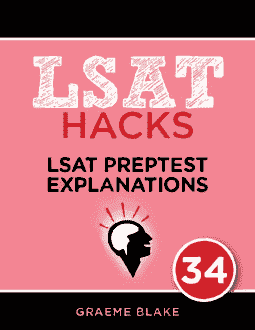QUESTION TEXT: People should avoid taking the antacid calcium…
QUESTION TYPE: Most Strongly Supported
FACTS:
- People should avoid calcium carbonate in doses large than 0.5 grams.
- It neutralizes stomach acids.
- But above a set dose it increases calcium in the blood and hurts the kidneys.
- And if you have half a gram you could trigger gastrin, a hormone that causes acid secretion.
ANALYSIS: Many people find answer choice D, the correct answer, confusing. The stimulus is written to make it sound as though if you take more than half a gram of calcium carbonate you will increase the amount of stomach acid in your system.
That could be true, but it doesn’t have to be. We’re not told how much stomach acid gastrin produces. It could be a very small amount. We’re also not told how much acid is neutralized by calcium carbonate. It could be a very large amount.
So if you took a gram of calcium carbonate then all we know is that some acid will be neutralized and some extra acid will be produced. But we don’t know if the total amount of acid will go up or down.
___________
- We don’t know how much stomach acid gastrin produces. It could be a very, very small amount. Direct neutralization might be most effective…but we risk hurting our kidneys.
- This is had to say…there are a lot of factors that could affect the kidneys. If people who avoid antacids are also much more likely to drink then maybe their kidneys will be worse off.
- This is very tempting. But we don’t know how much stomach acid is produced when we secrete gastrin. It could be a very, very tiny amount. If you ate ten pounds of calcium carbonate it might neutralize all of your stomach acid.
- CORRECT. The calcium carbonate directly neutralizes stomach acid. But it also triggers gastrin and so it indirectly contributes to the production of stomach acid too.
- It’s the other way around. Calcium in the blood impairs kidney function.


Why is D correct? All the paragraph says is that it has the capasity to neutralize stomach acids when LARGER than half a gram.
The “larger than half a gram” part is just a suggestion for people to avoid taking such a dose, and refers to the dangers of impairing kidney function.
The first sentence says that half a gram can neutralize stomach acid, and the last sentence says that half a gram can also stimulate acid secretion. Putting these two together, we get D.
Maybe I am misunderstanding you, but it seems to me like the first sentance of the stimulus is refering to the “dose LARGER than half a gram” to not only give a suggestion to not take it because it could lead to impaired kidney function, but also to tell us that there is a benefit of neutralizing stomach acids. But again, this only says Larger than half a gram. Who is to say it that less than that would also nuetralize?
The way I read it is that we know 1) doses larger than half a gram can neutralize acid; and 2) half a gram triggers acid secretion. The premise starting with “despite” gives us the possibility that less than half a gram could neutralize, since the point/warning about doses larger than half a gram is that it can impair kidney function. I do admit that the wording is slightly wonky, but I think it’s possible to realize that both 1 & 2 are about what happens when you have at least half a gram.
Another way to arrive at D is by eliminating the other answer choices. Sometimes, elimination might be a better strategy.
A) “more effective”: we’re not told anything about effectiveness
B) wrong population, we don’t care about people who don’t take it, and “less likely” is wrong since we don’t know anything about relevant likelihood
C) again, “effectively” and smaller than half a gram (wrong population) make this wrong
E) we don’t know about impaired kidney function and what it “may” do
Hi! Could you please explain in more detail how a test-taker can recognize D as correct? I’m not yet seeing it, and would really appreciate some more explanation– because to me C and D seem equally flawed, and equally plausible. First, the plausibility: WHY C?: Because it is implied that doses smaller than 0.5g neutralize acid, and we know that doses 0.5g & up also secrete acid. WHY D?: Because 0.5g CAN contribute to both secretion and neutralization. Now, the flaws: Why NOT C? Because we don’t know anything about whether doses smaller than 0.5g secrete acid, or how much — which would be vital information if we’re to evaluate which dose is more effective. We just know that doses of 0.5g or higher can secrete acid. (In other words, the flaw is: What if any dose of CaCO3, large or small, causes the body to secrete a single one-size-fits-all amount of acid that doesn’t vary, while the neutralizing power is proportional to the dose? In that case, the larger dose would be more effective, and C would be wrong.) Why NOT D? Because we don’t know how often 0.5g of CaCO3 causes acid secretion (–whether it USUALLY causes it, or only rarely). We just know that it CAN cause it. (Flaw: What if 0.5g triggers the secretion of acid in just 1% of patients? Then D would be wrong.) —- Thanks!
The key is that C also says *can*. So it doesn’t matter how often. The stimulus supports the fact that D is *possible*. You don’t need strong support for a possibility.